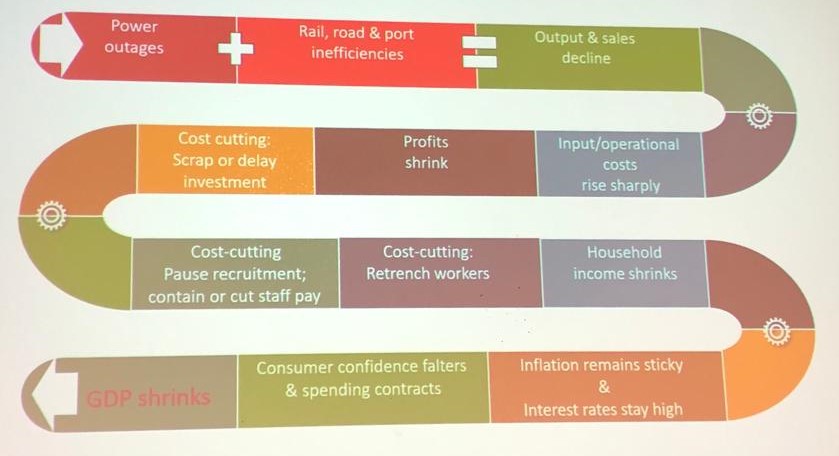Only six months into the year, South Africa experienced 30% more load shedding than in the whole of 2022. And while the hospitality industry has shown signs of resilience, it has been negatively affected.
This was highlighted during the second ‘Talking Energy with FEDHASA’ Summit yesterday (June 26) where Liandra da Silva, Economist at Nedbank Group’s Economic Unit, discussed the ‘Impact of the energy crisis on the economy and industry’.
For context, South Africa has been subjected to load shedding almost every day in 2023 – just over 157 days. The average load shedding stage throughout 2023 is stage 4 – in 2022, it was stage 3. This year has also seen more load shedding at higher stages of 4 and 6.
“Load shedding hurts output and drives up production/operational costs,” said Da Silva.
She revealed that the winter season had thus far been better than expected, but the shortage remained in the long-term.
“Accommodation has shown resilience, but there are signs of a slowdown in some sub-sectors such as caravan parks and camping sites, and guest houses and guest farms. The decline in the food and beverage sub-sector is more apparent,” Da Silva said.
She highlighted the following direct effects of load shedding on the hospitality industry:
- Higher costs (sourcing alternative sources of energy).
- Impacts on service delivery (resulting in customer dissatisfaction).
- Declining sales.
- Possible losses (particularly in the food industry – wastage).
Impact on consumers, investment and employability
Da Silva noted that, due to load shedding, consumers had less money to spend on holidays, which relates to fewer numbers in accommodation bookings.
“Households have eroded their savings, probably to sustain living standards.”
She said weak growth prospects and slowing investment would impact employment and incomes. “The anticipated slowdown in fixed investment will cap employment. Income will also come under pressure, exacerbating the slowdown of disposable income and consumption.”
She said it was not all doom and gloom, however, as external demand such as the improved number of tourist arrivals should offer some support.
Da Silva concluded by providing the following ‘load shedding cycle’, showcasing the impact flow on the hospitality industry:

Contingency plans
FEDHASA Chairperson Rosemary Anderson recently told Tourism Update that the vast majority of hospitality and tourism businesses had contingency plans in place to help mitigate the impact of load shedding.
“Most of them now have generators that come on automatically when there is load shedding, along with alternative energy supplies such as solar, batteries and inverters.”
FEDHASA is hosting several energy summits to further help tourism establishments combat the impact of load shedding.
The inbound association hosted its first energy summit in Cape Town three months ago, and would host its third in Durban next month, Anderson added.























